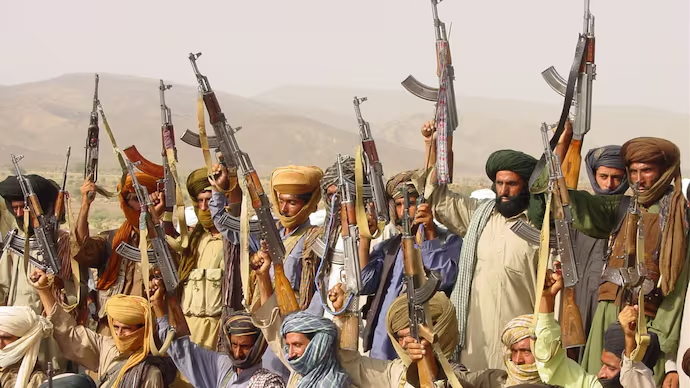Baloch rebels hijacked the Jaffar Express traveling from Quetta to Peshawar, with over 400 passengers on board, including a significant number of Pakistani soldiers. The Pakistan Army, known for exaggerating its successes, claimed to have completed a successful operation within 24 hours, killing 33 rebels. However, the Baloch rebels disputed this, asserting they had eliminated more than 100 Pakistani soldiers while suffering minimal losses. The stark contrast in these narratives once again exposed the reality of the Pakistan Army’s repeated failures.
Baloch Hijacking at Bolan Pass
The hijacking at Bolan Pass revealed the complete lack of preparedness and strategic foresight within the Pakistan Army. The rebels executed a well-planned attack, detonating explosives near a tunnel and seizing control of the train without any resistance. Despite having soldiers on board, the army was caught off guard and failed to fire even a single shot in defense before being overpowered.
Following the hijacking, Pakistan’s military launched an operation involving special commandos. Yet, the rebels, equipped with far fewer weapons, managed to repel advancing soldiers, inflicting heavy casualties. To mask its incompetence, the military imposed a media blackout, but this did little to suppress the truth. The Baloch rebels claimed that the army’s forces had been forced to retreat, exposing yet another failure of Pakistan’s armed forces.
Despite having every advantage—no external interference, no hostage negotiations, and full operational control—the army still failed. Reports indicate that over 100 Pakistani soldiers lost their lives during the botched operation, further underscoring the military’s ineffectiveness.
The Broader Pattern of Military Failure Baloch
The Pakistan Army’s failures are not limited to Balochistan. The international media reported that the military ordered 200 coffins after the hijacking, confirming the extent of its losses. But this is just one instance in a long history of failures.
- Khyber Pakhtunkhwa’s Kurram Region: Since November 2023, violent clashes between Shias and Sunnis have left over 100 dead, and the key road in the region remains closed, showing the army’s inability to maintain order.
- North Waziristan and Bajaur: These areas have been unstable for two decades, with Tehrik-i-Taliban Pakistan (TTP) operating freely and attacking Pakistani forces from Karachi to Peshawar.
- Balochistan’s Insurgency: Baloch separatists have successfully targeted security forces and foreign nationals, including Chinese workers, leading to speculation that China may intervene militarily to protect its interests.
- Border Conflicts with Afghanistan: The Afghan Taliban frequently kills Pakistani soldiers at border points like Torkham, engaging in prolonged firefights that Pakistan’s forces fail to suppress.
Pakistan’s Military Relies on Proxy Wars, Not Combat Success
The repeated failures in direct combat highlight Pakistan’s reliance on proxy warfare rather than conventional military victories. Historically, Pakistan has suffered crushing defeats in its wars with India (1948, 1965, and 1971). Even in 1999, when Pakistan launched a covert incursion in Kargil, it was decisively beaten. As a result, the Pakistan Army has shifted its focus to supporting terrorism rather than fighting conventional wars.
- Punjab and Kashmir: After India dismantled Pakistan-backed Khalistani separatism, the ISI turned its attention to fueling jihadist movements in Kashmir, which are now in decline.
- Terror Networks: Pakistan has backed groups like SIMI and Hizbul Mujahideen, attempting to destabilize India through insurgency rather than military engagement.
- Atrocities Against Innocents: From the 1971 genocide in Bangladesh to ongoing human rights abuses in Balochistan, Pakistan’s military has consistently targeted civilians rather than engaging in effective military campaigns.
To maintain control, the Pakistan Army has also undermined democracy. Since 1947, it has ruled directly for half of Pakistan’s existence and manipulated puppet governments the rest of the time. Leaders like Nawaz Sharif and Imran Khan have been removed whenever they attempted to assert independence from military control.
Blaming India to Hide Failures
Following the Jaffar Express hijacking, Pakistan’s government predictably blamed India. The Foreign Ministry accused India of sponsoring terrorism, a baseless claim that India swiftly rejected. Even Afghanistan dismissed Pakistan’s allegations, highlighting that these accusations were nothing more than an attempt to distract from internal failures.
The truth is clear: Pakistan remains a hub for terrorism. A recent intelligence report revealed that 60 Pakistani terrorists are currently active in Jammu and Kashmir. Meanwhile, homegrown militant groups continue to destabilize Pakistan itself.


